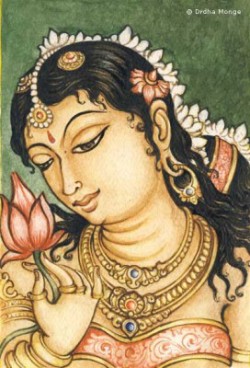by Sharvani
Few men are as temperamental as an artist, the nymph thought. She had bewitched kings, princes, knights, even sages, with less effort. It was uncommon to meet a man who did not fall prey to the extraordinary beauty of Ananya. Celestial poets could compose ballads about her eyes, the curve of her shoulder, the quirk of her lips and every part of her body. Ananya had no dearth of admirers, in heaven or on earth. As a renowned apsara, she supposed that any man, on perceiving her favour, would reciprocate fervently. But not Kalidasa, the genius poet and dramatist. Kalidasa, whose work Ananya knew in and out, whose words had the power to move her like nothing ever could.
Ananya was displeased by Kalidasa’s rejection, particularly by the indifferent way in which it was given. She had appeared to Kalidasa when he was reading some palm leaf manuscripts. Her descent from the clouds, with a gust of warm air, was ignored by the kaviratna. She whispered his name. When he looked at her, it was with eyes which saw beyond her beauty. He was not mesmerized by the silk garments draped fetchingly on her body. The pale yellow skin, unblemished by age or scars, was not noticed. The passionate expression on her face was certainly not returned. He gave her a polite nod and continued examining his manuscript.
Incensed by such a reaction, she sought to understand. The man was a great poet and writer. He was probably used to apsaras gracing his presence. If her beauty could not win him over, then she had to find another way. Ananya was determined to gain the love of this mortal legend, if only to prove to herself that she was worthy of the attention of every man on earth.
His plays, the three romances for which he was praised throughout the land, gave Ananya a way to seduce him. Maybe they held clues to what the author admired in women. Maybe she could show him how much she knew – and admired – his plays.
She decided to portray another apsara, the famed Urvashi. The kaviratna had written of her passionate love for the King Pururavas in Vikramorvasiyam. While Kalidasa had described Urvashi as a bewitching beauty, with a mysterious charm to her that made her alluring to the king. The Urvashi that Ananya knew, however, had more to her: Ananya thought she was haughtier and pompous in person. Yet, to the mortals below, Urvashi symbolized divine beauty and grace. Ananya had surmised that Kalidasa had written his view of what an ideal woman would be. On encountering Urvashi’s elegance, she expected him to be smitten.
Dressed in a thin, silk sari and decked in grand ornaments befitting a goddess, Ananya appeared outside his hut. He was meditating. Her soft steps drew his attention. He looked steadily at her face as she approached.
“Greetings, kaviratna.” she said with a musical lilt. Her cheeks blushed faintly and her smile was inviting. She stood in front of her love, in a pose that she had seen Urvashi hold in Indra’s court, with a hand on her hip and the other holding a lotus near her face.
Yet this disguise had no effect on him. He acknowledged her with a bow, and then went back to studying his scriptures.
Ananya, humiliated by the casual dismissal, vanished after a few seconds. A part of her respected him for his strength. She had found a man who would not count her beauty as her only quality. Her resolve hardened and she sought another answer from the works of the Kavi.
As she knew well, the professed opinions of men varied from their actual thoughts. While in Vikramorvasi the poet had written eloquently about angelic beauty and seemed entranced by a majestic lover, his heart might desire a different kind of a woman. This time Ananya took her cue from Shakuntala. Abhijnanashakuntala, Kalidasa’s seminal drama, was renowned for its beautiful, heroine, Shakuntala. The sweet, innocent maiden bewitched the king without explicitly trying to. She was the sort of woman that most men would sacrifice anything for – docile, beautiful, unsullied. A woman to be treasured. Ananya had taken it as a confession of the writer’s yearning. Shakuntala’s shy, playful manner might succeed where Urvashi’s grace and pomp failed. Maybe Kalidasa needed a gentle invitation!
Thinking thus, she did not approach the kavi directly. Instead, she walked just within his visible range. She used a basket as a prop and began gathering flowers from the shrubs and trees outlining the kavi’s house. She pretended to be completely engrossed in her task. She looked at the man from the corner of her eye. He was reading again.
After a few minutes, she glanced over. He was watching her intently now. She feigned a surprised expression and continued picking flowers. Ananya added a hint of provocation to her movements, a slight nervousness to her actions. When she looked toward the door again, expecting Kalidasa to be spellbound, he was gone. Dispensing with the coquetry, she searched around his house. Then she heard snores coming from inside the house. Why, that insufferable man!
Huffing angrily, the nymph threw the basket down and screamed into the clouds. She was flummoxed by his behaviour. This man, a poet who wrote such brilliant romantic verses, was unmoved by beauty or innocence. What was she doing wrong? Do subtle hints go unnoticed on this genius? At a loss, Ananya chose the remaining play, Malavikagnimitram. Here she found a character who was bold and sensuous. Malavika was probably the woman all men fantasised about in the far reaches of their minds. In a final effort to win his heart, she decided to perform a dance.
Her arrival this time was conspicuous. She strode confidently towards Kalidasa. As soon as he looked at her, she began to dance. Everything about the action was intended to seduce: her flashing kohl-lined eyes, the dark sari, her hips swaying to the rhythm of invisible beats. She held his gaze and advanced near him, dancing all the while. He seemed transfixed. She almost reached the porch and confident that she was finally successful, she gave her love a tempting smile. He stood up at that moment and turned his back on her.
He was going back into the house.
“No!” she shouted.
He stopped walking, but didn’t turn around.
“What is wrong with you? For the past few days I have tried everything in my power to gain your love. Yet you scorn and push me away. How are you immune to my charms?”
He gave her an intense look which she could not decipher. She could not comprehend anything about this confounding mortal!
“Why? Why do you not respond?” she cried in despair. “All I want is your love.”
Kalidasa went inside.
Ananya broke down at the cruel rebuff. She felt like her heart was dying.
Kalidasa came back. He was holding scrolls in his hand. “Is this what you wanted?” he asked her.
“What is that? I don’t want any scriptures,” she sniffled.
“These, my dear, are the plays I wrote. You must recognize them. After all you acted out the lead characters beautifully with your prodigious skills.”
At least he had recognized her efforts. “It was done to earn your affections.”
“Why would you think that was the way to my heart?”
“They are your plays. They must have some clue as to what desire in life.”
Kalidasa gave a short laugh. “You are mistaken. These are the thoughts and desires of my audience, my characters, not mine.”
“But your characters – Urvashi, Malvika, Shakuntala – they represent the ideal woman. Is that not what you seek?”
“Of what use is the ideal woman if the romance only lasts in the pages? Maybe if I lived in the world of short scenes and happy endings, I would want the same things as my characters. But I don’t. And neither do you.”
Ananya was surprised by the last statement. “What do you know about my life?” she huffed.
“I know that it must be an unhappy one,” said Kalidasa, “…if you have to resort to loving an old man and want to share his solitary life. If it was just another passing fancy, you would have given up soon.”
Ananya thought about this for a while. She stepped back and changed into her real form. She was still very beautiful, but not as a forgery of another. She smiled at Kalidasa. A genuine smile. To her surprise, he answered with a broad grin.
Ananya had had her way. She had the kaviratna’s attention, at long last.






